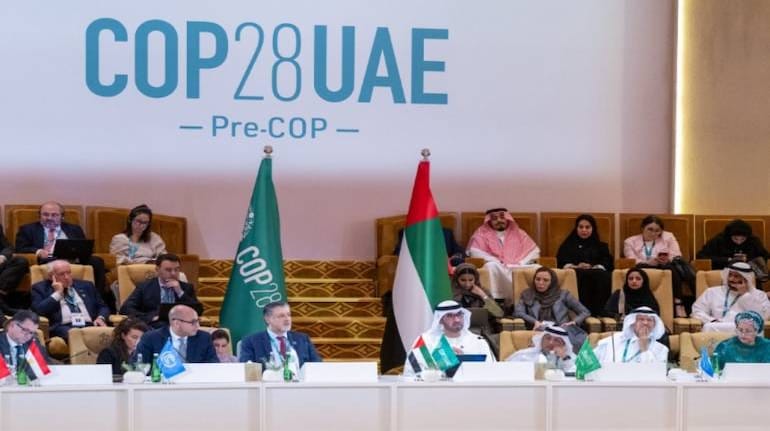



In a voluntary initiative at the UN climate meeting in Dubai, summit president Sultan Al Jaber launched a series of pledges aimed at hastening the green energy transition and significantly reducing global emissions.
Chief among them was the Global Renewables and Energy Efficiency Pledge which seeks to triple global renewable energy capacity and double the rate of energy efficiency by 2030.
The pledge was part of several declarations made at the 28th Conference of the Parties (COP28) to the United Nations Framework Convention on Climate Change to decarbonise the energy sector, which accounts for some 75 percent of planet-warming greenhouse gas emissions. It is outside of the formal negotiations at the climate summit and serves more as a declaration of intent.
Driven by the host United Arab Emirates, the European Union, and the US, the pledge promised to triple worldwide renewable energy capacity to at least 11,000 gigawatts and double the global average annual rate of energy efficiency improvements from about 2 percent to more than 4 percent every year until 2030.
“The world does not work without energy. Yet, the world will break down if we do not fix energies we use today, mitigate their emissions at a gigaton scale, and rapidly transition to zero carbon alternatives,” said Al Jaber, who is also chief executive of Abu Dhabi National Oil Company, one of the world’s largest oil and gas producers.
 COP-28India refrains
COP-28India refrainsThe commitments were made under the broader umbrella of the Global Decarbonization Accelerator (GDA), which aims to eliminate fossil fuels from the global energy system by 2050. The proposed measures included broadening nuclear power, plugging methane emissions, and curbing private investment in coal-fired power.
It also covers the Global Cooling Pledge, which targets reducing global cooling emissions by 68 percent by 2050. This alone accounts for 7 percent of the global total, a figure expected to triple as more nations adopt air-conditioning.
Although more than 100 countries signed the green energy pledge, India refrained, surprising experts and observers. This was even though India pushed through a commitment for a global tripling of renewable energy capacity under its presidency at the G20 summit earlier this year.
Observers explained that the pledge, instead of mentioning a phasing out of all fossil fuels, urged countries to phase down the unabated use of coal and end investment in coal-fired energy. This, they said, posed a problem for India, which has always maintained it would need to rely on coal for some more time to ensure the country’s energy security.
In addition, India has been deploying renewables at a rapid clip and has promised in its nationally determined contributions to increase green energy capacity to as much as 50 percent of its total power generation capacity.
“This is global acceptance of what was agreed to during India’s G20 presidency,” said Alok Kumar, former power secretary.
The New Delhi Declaration of the G20 under India’s presidency, adopted in September this year, said all member nations “will pursue and encourage efforts to triple renewable energy capacity globally through existing targets and policies, as well as demonstrate similar ambition concerning other zero and low-emission technologies, including abatement and removal technologies, in line with national circumstances by 2030.”
The G20 accounts for over 80 percent of global emissions and a collective effort by the grouping to decarbonise is a crucial step in combatting climate change.
“India has already committed to tripling the renewable energy target as part of G20, which was reiterated by Prime Minister Narendra Modi,” said Vibhuti Garg, director, South Asia, Institute for Energy Economics and Financial Analysis. “India will make a case for the Global North that if the world wants the developing countries to transition, experiencing huge growth in electricity demand, they will need more funding support.”
Methane emissionsThe GDA also makes an explicit mention of methane and greenhouse gases other than carbon dioxide. It aims to address this through an economy-wide reduction of methane emissions, supporting this by mobilising $1 billion for abatement projects.
This, too, is problematic for India, which argues that it would adversely impact the country’s agricultural sector. Large amounts of methane are produced by rice cultivation and cow belching. The livelihoods of millions of Indian farmers depend on cultivating paddy and rearing livestock.
Additionally, India has traditionally been less than enthusiastic about signing declarations and pledges at the annual climate negotiations, officials said. These have in recent years emerged as a new way to push through various agendas without running through the negotiations process.
It also has to be in mind that negotiations at the climate summit have just begun and the process will continue till December 12, officials said. There are expectations that the aim of tripling renewables capacity will find an explicit mention in the outcome.
India’s commitment to renewable energy cannot be questioned and it is doing much more in this regard than any other country, officials said.
Decarbonisation initiative pannedThe GDA initiative has been severely criticised by experts and activists.
“GDA is greenwashing,” said Catherine Abreu, executive director of Destination Zero, a Canadian non-profit. “The climate crisis is a fossil fuel crisis and we must accelerate their phase down.”
Calling the accelerator a “dangerous distraction from the COP28 process,” David Tong, global industry campaign manager at advocacy group Oil Change International, said the world needs “legal agreements, not voluntary pledges.”
“We don’t have time to waste with more pledges and initiatives with fancy names,” said Cansin Leylim Ilgaz, associate director of global campaigns at 350.org, an environmental organisation. “We need a fast, fair, and equitable fossil fuel phase-out that does not rely on dangerous distractions.”
The criticism was largely in line with the views of the UN, which has been constantly asking countries signatories to the 2015 Paris Agreement to reach a consensus on phasing out fossil fuels instead of prevaricating. The Paris climate pact aims to contain global warming to within 2 degrees Celsius compared with preindustrial times and make efforts to keep it within 1.5 degrees.
“We need a strong commitment to phase out fossil fuels on a clear time frame that aligns with the 1.5-degree limit,” UN Secretary-General Antonio Guterres said in a statement on November 3. “No more delays. No more foot-dragging. No more greenwashing.”
The energy pledge said that to meet the goals of the Paris Agreement, renewables deployment must be accompanied in this decade by a rapid increase of energy efficiency improvements and the phase down of unabated coal power, in particular ending the continued investment in new coal-fired power plants, which is incompatible with efforts to limit warming to 1.5 degrees.
The new pledge “adds up to more countries and more companies from more sectors than ever before, all aligning with our North Star of 1.5 degrees,” Al Jaber said in an address at the summit.
India’s absence from the list of nations signing the pledge disappointed some experts.
“It’s disheartening that India has not signed on to the global pledge,” said Madhura Joshi, senior associate, India energy transition lead at E3G, an international think tank. “The hope is that India will champion tripling renewables and doubling energy efficiency by 2030 at COP28 in the main text.”
Discover the latest Business News, Sensex, and Nifty updates. Obtain Personal Finance insights, tax queries, and expert opinions on Moneycontrol or download the Moneycontrol App to stay updated!
Find the best of Al News in one place, specially curated for you every weekend.
Stay on top of the latest tech trends and biggest startup news.